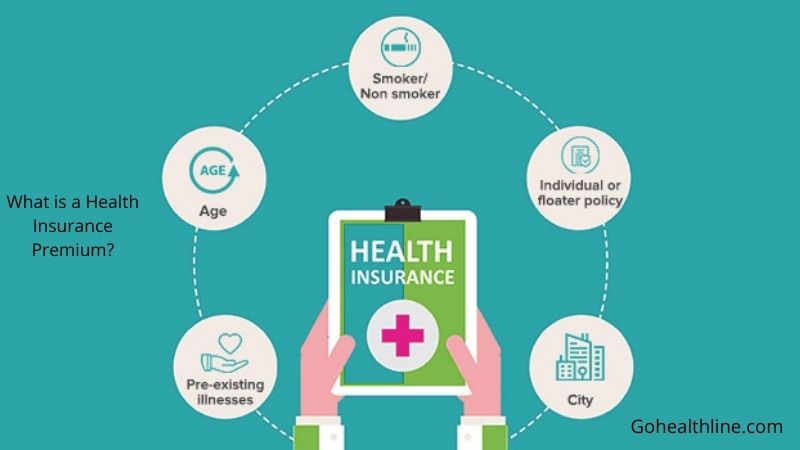What is a health insurance premium? Health insurance premiums are payments made in advance on behalf of an individual or family in order to keep a health insurance policy in effect. Premiums are usually paid monthly when making purchases in individual markets, but people who purchase insurance through an employer usually pay a portion of the premium by deducting it from their wages.

In addition to premiums, consumers may have to pay for themselves when they get health care services, such as deductibles, copays, and coinsurance.
KEY FINDINGS
All other factors being equal, higher premium plans tend to have less pocket money than other plans from the same insurer. Higher deductible plans with lower.
- Monthly Health insurance premiums may generally be cheaper if you or your covered dependents need relatively few health care services.
- If you are not eligible for health insurance at work, you may be eligible for government subsidies through Medicaid or Exchange Traded Health plans.
- Individuals 65 and older typically pay significantly lower premiums through Medicare than premiums sold in individual markets.
Similar article: How Long Can a Child Stay on Parent’s Health Insurance?
What is a Premium for Health Insurance?
The health insurance premium is a cost you usually pay on a monthly basis to maintain your insurance policy. Failure to pay premiums will result in the insurer denying health insurance.

Premiums aren’t the only cost of getting medical services. Even after you pay your monthly fee, you may still have to pay your own personal expenses, depending on the amount and type of care you receive. These include:
Deductible: Medical expenses that must be paid before the insurance begins to pay the bill.
Co-pays: Co-pay is a fixed amount you must pay to cover costs such as doctor visits and prescriptions during services. The insurance company pays all or part of the remaining amount.
Coinsurance: Percentage of medical expenses owed even after the deductible has been reached. The insurer pays the remainder of the bill.
The size of these out-of-budget spending limits tends to vary from Health insurance premiums plan to insurance plan. Even the same insurer can have different plan levels.
In general, the higher the value of your premium, the lower your own costs. The Plan also has an annual cash cap. Once that amount is paid, you will no longer have to pay any coinsurance or co-pays for the covered medical expenses you incur.
What is a Monthly Premium for Health Insurance?

Special Considerations:
Many employers offer health insurance as part of their payroll package, usually paying a portion of the premium to their employees.
One of the reasons they do this is to comply with the Affordable Care Act (ACA), which requires employers with 50 or more full-time employees to provide coverage that meets minimum cost and availability requirements. Companies that do not comply are subject to severe fines.
- A survey conducted by the Society for Human Resource Management found that 20% of employers said healthcare benefits continued to rise; with cost per employee reaching $15,000 in 2019.
- It could be much higher. Employer subsidy;
- It’s because you’re not working or your job doesn’t have insurance.
- Low and middle-income earners without employer coverage have several options to reduce their premiums.
- One is to see if you qualify for Medicaid,
- a state-run federal program that offers premiums that are generally lower than those sold in individual markets.
- According to many Foundations,
- more than two-thirds of beneficiaries receive care through government-contracted managed care plans2.
- The rest receive paid medical care.
- Even if your income is so high that you qualify for Medicaid,
- You may be eligible for a tax credit or government subsidy if you purchase a plan from a health insurance exchange and meet income requirements.
- To be eligible, your income must be less than 400% of the federal poverty line.
- For adults 65 and older,
- Medicare uses payroll tax revenues to give members of this age a cheaper option than typically found in the private market.
- Most beneficiaries do not pay premiums under Medicare Part A,
- which covers hospital costs.
- In 2021, the standard monthly premium for Part B,
- the section that repays medical services and supplies, will be $148.50 per month and $203 deductible annually.
- These costs may be higher or lower depending on your income and social security coverage.
What is a Premium Tax Credit for Health Insurance?
If at the end of the year, you have taken out a higher premium tax credit based on your final income, you will have to repay more when you file your federal tax return. If you take less than the qualification, you will get the difference back.
Example of health premium insurance:
Assume that you purchase health insurance from an individual market because your employer does not provide coverage as part of your benefits package. Insurance company XYZ has two plans.
- The first plan has a monthly premium of $800, an annual deductible of $1000,
- and a coinsurance of 20%.
- The second plan offered by XYZ has a monthly premium of only $400,
- but a higher deductible of $5,000 and coinsurance of 30%.
- The first option is twice the premium.
- So, if you incur relatively little medical expenses for a year,
- it will be more expensive than buying a second plan.
- However, you may need this first plan if you are staying overnight and need hospital visits or multiple doctor visits throughout the year.
- After you pay the first $1,000 of covered medical costs,
- your plan pays 80% of the remaining costs until you reach your cash limit.
- However, you still have to pay 20% for coinsurance.
- One of the benefits of a high deductible and low premium health plan is that you can pay your personal expenses through a health savings account (HSA).
- HSA contributions are tax-deductible and are withdrawn as long as they are used to cover eligible medical expenses.
- In 2020 and 2021, individual plans with a deductible of $1,400 or more and family plans with a deductible of $2,800 or more will be recognized as high-deductible health plans.
FAQs
What does premium mean in health insurance?
The amount you pay for your health insurance every month. In addition to your premium, you usually have to pay other costs for your health care, including a deductible, copayments, and coinsurance. If you have a Marketplace health plan, you may be able to lower your costs with a premium tax credit.
What is an insurance premium and how does it work?
An insurance premium is the amount an individual or business pays for an insurance policy. Insurance premiums are paid for policies that cover health care, auto, home, and life insurance. Once earned, the premium is income for the insurance company.
What is a health insurance premium Quizlet?
The premium is the amount paid to an insurance agency for a health insurance policy. The premium is often paid on a monthly basis.
Conclusion
This is the amount you pay for your Health insurance premiums each month. In addition to premiums, you will usually have to pay other medical expenses, including discounts, benefits, and monetary insurance. If you have a marketplace health insurance plan, you can save money through tax deductions. When purchasing a plan, keep in mind that a plan with a minimum monthly premium may not be right for you. If you need more health care, premiums are slightly higher, but a plan with a lower discount can save you a lot of money.

Originally, the LIVE IPL 2021 was scheduled between April 9, 2021 and May 30, 2021. On May 4, 2021, due to the COVID situation in India, the tournament was postponed. Later, on June 7, the BCCI announced the takeover of IPL from September 19 in the United Arab Emirates.